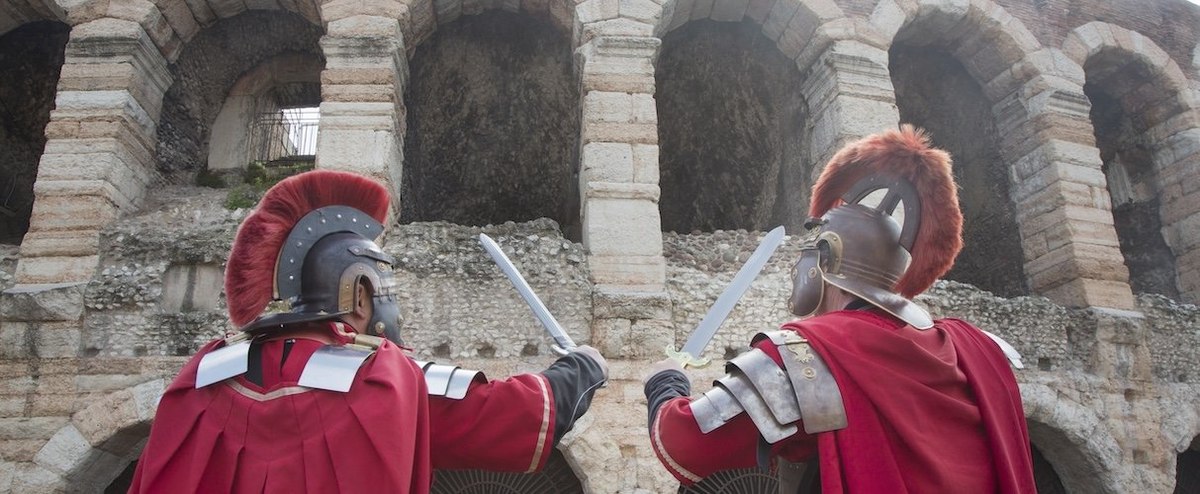Most Americans say they know at least a little about the Roman Empire, and a majority view ancient Rome favorably.
Overall 5% of U.S. adult citizens say they know a lot about Rome, while 21% know a fair amount and 50% say they know a little. 19% say they know nothing at all about the Roman Empire, and 5% aren't sure.
Men are more likely than women to say they know about the Roman Empire, and college graduates are more likely than non-college graduates to say so.
The most common source of Americans' knowledge about Rome is school — 73% of Americans who know at least a little about the Roman Empire say they learned about it there. 52% say they learned about the Roman Empire from movies or TV shows, while 40% credit nonfiction books or articles, 29% websites, 26% nonfiction videos, and 19% novels. 14% of Americans who know at least a little about Rome say they learned about it from people they know. Only 9% say they learned about the Roman Empire from podcasts.
Americans who know a fair amount or a lot about the Roman Empire are much more likely than those who only know a little to say they learned about it from books, articles, websites, or nonfiction videos.
Contrary to a recent meme, most people — men and women — don't think about the Roman Empire every day. 9% of U.S. adult citizens say they think about the Roman Empire at least weekly, including 1% who say they think about it daily; another 9% say they think about it roughly once a month. 47% say they never think about the Roman Empire. 13% of men say they think about Rome at least weekly, compared to 6% of women.
Thumbs-up to Rome
What Americans do know about the Roman Empire tends to be positive. 49% of U.S. adult citizens say they think the Roman Empire had either a very or somewhat positive impact on the world, while 15% say it had a very or somewhat negative impact.
The more people say they know about the Roman Empire, the more positively they view it. Among people who know a lot about Rome, 74% have positive views and 11% have negative ones, a 63-percentage-point gap. People who know a fair amount about the Roman Empire are 53 points more likely to view Rome's impact positively, while people who know a little are 37 points more favorable than unfavorable.
Liberals, moderates, and conservatives are all more likely to say the Roman Empire had a positive impact than a negative impact, though conservatives are slightly more likely than liberals to view Rome's impact positively.
Favorable views of the Roman Empire are ahead of many other premodern countries and groups YouGov asked about. Only ancient Athens, viewed very or somewhat favorably by 54% of Americans and very or somewhat unfavorably by 10%, was more popular than the Roman Empire (49% favorable, 19% unfavorable).
The Roman Empire was more popular than ancient Sparta (41% favorable, 18% unfavorable), the medieval Holy Roman Empire (35% / 28%), the Byzantine Empire (31% / 16%), Carthage (28% / 15%), the Achaemenid Persian Empire (25% / 24%), the Visigoths (14% / 21%) and the Huns (14% / 43%).
Americans rated the "Roman Empire" more favorably than they did the "Roman Republic," which was viewed favorably by 40% and unfavorably by 14%. Both men and women were more likely to rate the Roman Empire more favorably than the Roman Republic, as were all of liberals, moderates, and conservatives. Americans who say they know "a lot" about the Roman Empire preferred the Republic by 28 points, while those who know "a little" prefer the Empire by 10 points.
What aspects of the Roman Empire Americans like
Besides the Roman Empire overall, YouGov asked respondents about different aspects of the empire. Roman buildings and roads and Roman art and literature were each rated positively by more than 70% of those Americans who know at least a little about the Roman Empire.
The longevity of the Roman Empire, its conversion to Christianity, its political structure, its pagan religion, and its military conquests are each viewed positively by more Americans than view them negatively, among the population who knows at least something about the Roman Empire. And Americans overwhelmingly say Roman slaveholding was a mostly negative aspect of the Roman Empire.
Most of these views about aspects of the Roman Empire are broadly held by different demographic groups, but some divide opinion. For example, majorities of conservatives who know at least a little about the Roman Empire say its military conquests and conversion to Christianity were good things; majorities of liberals say they were bad things.
When it comes to ancient figures, no one YouGov asked about polled better than Cleopatra, queen of Ptolemaic Egypt from 51 to 30 BC: 55% of Americans have a favorable opinion of Cleopatra, while 20% have an unfavorable opinion.
That makes Cleopatra more popular than her one-time lover, the Roman general Julius Caesar, viewed favorably by 45% and unfavorably by 28%. Saint Augustine, the theologian and philosopher, and Marc Antony, the general who was Julius Caesar's friend and later Cleopatra's ally and lover, are also fairly popular: 41% of Americans view each of them favorably.
More than half of Americans say they don't know enough to have an opinion about Emperor Constantine I, the first Roman emperor to convert to Christianity. (Respondents were asked about their view of "Constantine I," not "Constantine the Great" or "Emperor Constantine.") Also unknown by more than half the population are the emperor and philosopher Marcus Aurelius, and Justinian I, the 6th-century Eastern Roman or Byzantine emperor.
The only two ancient figures polled about who are more disliked than liked are Brutus, Julius Caesar's friend-turned-assassin, and the emperor Nero.
The fall of Rome
One hotly debated topic among scholars of the ancient world concerns how the Roman Empire ended in the West. One view emphasizes what 18th-century historian Edward Gibbon termed the empire's "decline and fall"; a second view emphasizes the ways in which Roman culture and institutions endured long past the deposition of the final Western emperor in 476 A.D.
Neither side of that academic debate appears to have a dominant hold over the American public. When considering which of two statements come closer to their beliefs, 46% of U.S. adult citizens say the Western Roman Empire declined and fell, and 54% say the Western Roman Empire changed into something new but many of its institutions persisted.
Conservatives are more likely than liberals to say the Roman Empire declined and fell. Belief that the Roman Empire changed instead of falling rises with self-professed knowledge about the empire — except among the small group of people who say they know a lot.
Whether it was a violent collapse or a gradual transformation, the end of the Western Empire is most likely to be blamed by Americans on Roman infighting: 61% say that had a big impact, and another 18% say it had a small impact.
Other factors many Americans see as having a big impact on the end of the Western Empire are attacks by groups such as the Huns and the Goths (50% say this had a big impact), and disease epidemics (40%). 38% of Americans say Rome's conversion to Christianity had a big impact on the Western Empire's end, while 36% say migration from beyond Rome's borders did, and 32% blame a decline in Rome's fighting spirit.
The least popular explanation offered for the fall of Rome is a changing climate. Some scholars argue that the cooling after the end of the so-called Roman Warm Period circa 400 A.D. contributed to the empire's decline, but only 11% of Americans say changing climate had a big impact on the end of the Western Empire; 40% say this had no impact.
Conservatives are somewhat more likely than liberals to blame immigration and a decline in Roman fighting spirit for the end of the Western Empire, while liberals are more likely to say Rome's conversion to Christianity and climate change played a role. (Only 17% of liberals say a changing climate had a big impact on the fall of Rome, however.)
See the results for this YouGov poll
Methodology: This poll was conducted online on May 30 - June 6, 2024 among 2,205 U.S. adult citizens. Respondents were selected from YouGov’s opt-in panel to be representative of adult U.S. citizens. A random sample (stratified by gender, age, race, education, geographic region, and voter registration) was selected from the 2019 American Community Survey. The sample was weighted according to gender, age, race, education, 2020 election turnout and presidential vote, baseline party identification, and current voter registration status. Demographic weighting targets come from the 2019 American Community Survey. Baseline party identification is the respondent’s most recent answer given prior to November 1, 2022, and is weighted to the estimated distribution at that time (33% Democratic, 31% Republican). The margin of error for the overall sample is approximately 2.5%.
Image: Getty (Grant Faint)
What do you think about the election, American politics in general, and everything else? Have your say, join the YouGov panel, and get paid to share your thoughts. Sign up here.












